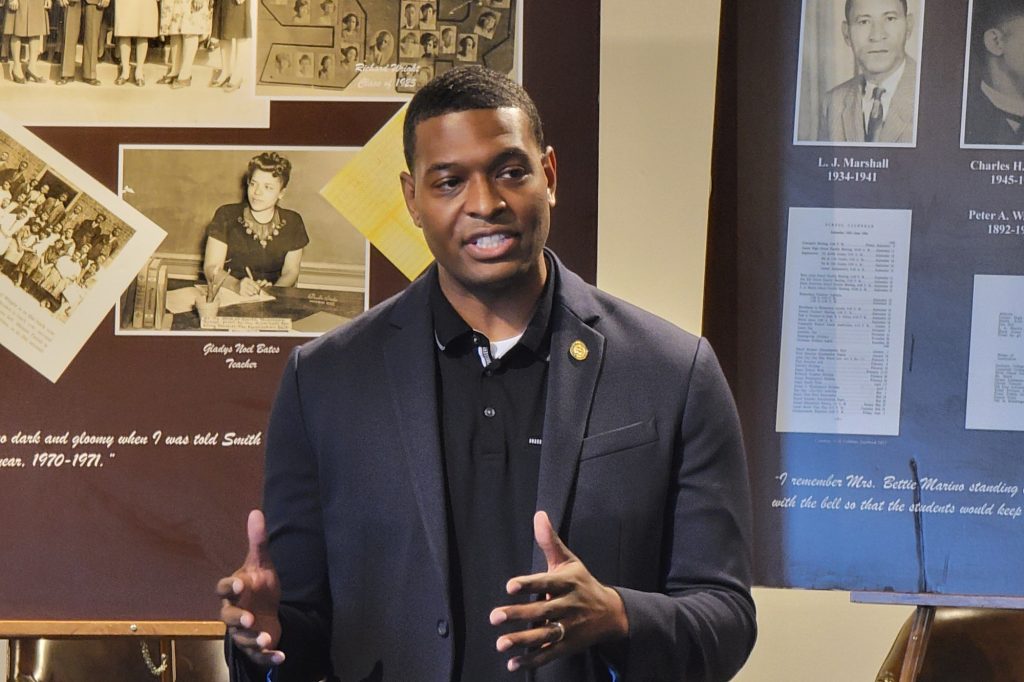JACKSON, Miss.—Michael S. Regan, the head of the U.S. Environmental Protection Agency, is touring Jackson today and addressing topics on the environment with an emphasis on the city’s longstanding water infrastructure woes.
During February and March, most residents of the 82% Black capital city went a month without clean running water after a historic winter storm damaged the city’s already frail water system. Today’s visit is the kickoff for the EPA administrator’s “Journey to Justice: Real Environmental Justice Conversations On Your Corner” tour that will include stops in Louisiana and Texas this week.
“Jackson has so many of the issues that have played in our communities all throughout the country,” Regan said while speaking to Jackson community leaders this morning at the Smith Robertson Museum in downtown Jackson. “What better place to start the Journey For Justice Tour than Jackson, Mississippi?”
Last month, a lawyer representing Jackson families sued the City, alleging that its water system has subjected hundreds of children to lead poisoning.
The EPA said in a press release this morning that the administrator will also “discuss the benefits of President Biden’s Bipartisan Infrastructure Deal and the Build Back Better agenda, and the Administration’s commitment to delivering environmental justice.” Both houses of Congress have passed Biden’s $1.2-trillion infrastructure bill, and the president plans to sign it later this week; his more ambitious “Build Back Better” agenda is still under negotiation.
Under the infrastructure bill Biden is set to sign into law this week, Mississippi will receive nearly $4.5 billion in federal funds from the deal over a five year-period for projects ranging from broadband, water infrastructure, roads and bridges, electric vehicle charging stations, public transportation and high-speed internet. The state will also receive $429 million for water-system repairs, but that will be spread across the state. Jackson’s mayor has estimated that the capital city alone could need $1 billion to fully repair its water system.
“This is a conversation about what all people in this country deserve. … This is about the disproportionate impact that our communities have been facing for decades,” Regan, who became the first Black man to serve as EPA chief when Biden appointed him in March, said this morning. “I don’t believe that all of the solutions are academic. I believe you all have been on the ground for years, determining what real solutions are for your communities.”
Only two members of Mississippi’s congressional delegation voted for the infrastructure bill: U.S. House Rep. Bennie Thompson, the state’s lone Black or Democratic member of Congress, and U.S. Sen. Roger Wicker, a Republican. The state’s remaining four members, all Republicans, each voted against it, including U.S. House Rep. Trent Kelly; U.S. House Rep. Michael Guest; U.S. House Rep. Steven Palazzo; and U.S. Sen. Cindy Hyde-Smith.
Thompson joined Regan for today’s tour, which began at the Smith Robertson Museum this morning and continued with a visit to the Jackson Water Treatment Facility at 11:15 a.m. Regan’s schedule also included planned stops at Wilkins Elementary School at 12:30 p.m.; a tour of South Jackson at 1:55 p.m.; a tour of the Queens neighborhood at 3:30 p.m.; and a tour of Farish Street Historic District at 4:10 p.m.








